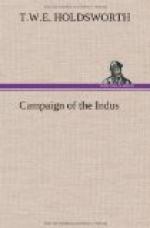However, on entering the gate, we found matters not so easy as we expected. The streets were very narrow and so intricate that they formed a perfect labyrinth, and it was very difficult to make any progress through them. The men, therefore, soon got scattered about and broken into small parties; and some, I am afraid, thought of loot, or plunder, more than of endeavouring to find their way to the citadel. I forgot to mention that during the time we were under cover, the 17th and 31st Native Infantry had moved round the hill and taken up a position on our right. These two regiments were ordered forward and into the town and at the same time and the same gate as we were. The whole force, therefore, entered the town nearly together. I followed with a party of our men, and we pushed along as well as we could through streets, by-ways, &c. This was rather nervous work, as we never could tell what we had to expect before us; there was no open enemy to be seen, but whenever we came to an opening exposed to the citadel, a few bullets invariably came whizzing in about us, and knocked over a man or two; moreover, having the recollection of Ghuzni fresh in our minds, we expected every moment a rush of some desperate fellows from the narrow holes we passed through. After groping my way through narrow passages and all sorts of agreeable places, I found myself in the exact spot I had started from—viz., the gate by which we had entered. Here a man of our Light Company came and told me that he had discovered a way to the citadel, and begged me to put myself at the head of a few men there collected. Of course I did so, and in a short time we found ourselves in a large courtyard, with stables, &c., full of horses and Beloochees; right under the windows of the citadel. These men cried out for “aman,” or “mercy;” but the soldiers recollecting the treachery that had been practised at Ghuzni in a similar case were going




